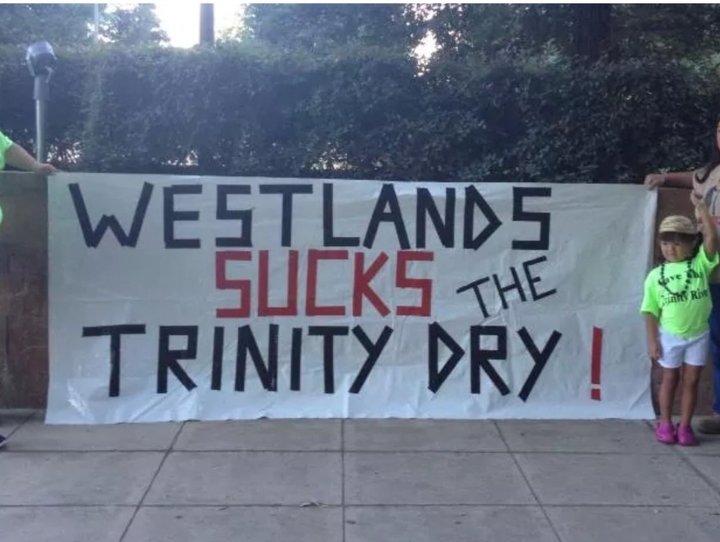
Photo: Hoopa Valley Tribe.
###
ELSEWHERE:
- ”California Judge Rejects Water Deal for Major Farm Supplier,” The Business Journal (Fresno).
###
Press release from the Hoopa Valley Tribe:
Today, a Fresno County Court shocked industrial agricultural interests in California’s Central Valley by disapproving the massive Westlands Water District’s federal contract for water from the Central Valley Project.
Federal law requires state courts to ensure public review of contracts between water districts and the Bureau of Reclamation. Without a decree from the Fresno court, the contract could not bind Reclamation to its terms.
Westlands filed a document it said was a contract with the Fresno court in October 2019. But the “contract” had no signatures and was missing essential financial terms. Among the missing terms is repayment of $400 million in costs including those contractors owe for environmental restoration of the damage caused by 80 years of Central Valley Project water and power use.
In the 1992 Central Valley Project Improvement Act (CVPIA), Congress made environmental restoration a CVP purpose and payment for restoration a cost of doing business for the contractors. Without cost collection from the contractors, the restoration will likely fail.
Another version of the contract was signed by Westlands and Reclamation four months later, in February 2020. But that was too late for the Fresno court because Westlands had not given the public notice required by California Law of the second document or an opportunity for public review.
Neither version of the contract required payment of Westlands’ share of the $400 million CVPIA environmental restoration obligation.
The court found that by using an incomplete contract, Westlands, and by implication other Central Valley water contractors, and the federal Bureau of Reclamation, had withheld key financial terms from public review.
“The Hoopa Valley Tribe’s Trinity River fishery is one of the CVP’s victims,” said Hoopa Valley Tribal Chairman Joe Davis. “But the contractors never wanted to pay the costs of restoration that Congress made a condition of future water delivers in the CVPIA.”
“Westlands led the charge against paying and has opposed Trinity restoration for decades,” said Hoopa Fisheries Director Michael Orcutt.
“But Westlands wouldn’t exist without Trinity River water being taken from our fishery,” added Vice- Chairman, Everett Colegrove Jr. “And that transfer of wealth has generated billions for Westlands and other CVP contractors, with devastating impacts to Hoopa’s economy, culture, and community.” For more than ten years, Hoopa tried to get Reclamation to charge the contractors for Trinity Restoration costs. “It’s no secret that the Westlands Water Corporation sells the Trinity River water for hefty profits. Yet, we could never get a straight answer on the accounting from Reclamation,” said Orcutt. “But we knew that these CVP contracts were going to be permanent, and it was our last chance to make sure Reclamation collected the money.”
“It turns out that the missing Trinity River fishery restoration collections were the tip of the financial iceberg,” said Chairman Davis. “The Bureau wasn’t charging any contractor for the full cost of restoration throughout the entire CVP service area.”
As these contracts were being negotiated, Reclamation made clear to Hoopa that it would ignore the financial accounting Hoopa sought and the law required. “Hoopa decided that it had no choice but to sue its federal trustee, the Federal Interior Department, said Orcutt. “We have been in federal court since August 2020.”
“Hoopa has documented the Trump Administration’s financial misconduct and submitted its evidence to Secretary Haaland, the Biden Administration’s Office of Management and Budget, and Congress,” said Colegrove.
“In August, I met with Secretary Haaland and explained what Reclamation had done and how it was destroying Hoopa’s fishery, which the government holds in trust for us,” said Davis. “The Secretary instructed her staff to work with us to settle our case. I am confident that Secretary Haaland will fulfill her commitment to environmental justice and our rights by requiring amendment of these contracts now that the court has given her the opportunity to do so.”
CLICK TO MANAGE